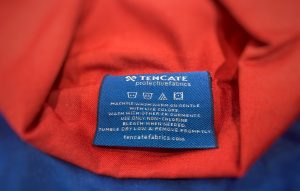You may have a lot of questions regarding flame resistant (FR) clothing and how to properly care for and maintain them. In this blog, we will provide general guidelines on how to wash your FR clothing including when to use industrial laundering or at-home laundering.
Industrial laundry vs. Home laundering
Industrial laundering is an efficient way to wash your workwear clothing, aprons, and other equipment. They remove oil stains, metal fillings and dust, thus providing safe and clean equipment for any industry. Home laundry is a safe, cost-effective alternative to industrial laundering.
The maintenance of workwear, especially if CE certified as Personal Protective Equipment, it is more often assigned to industrial laundries rather than by home washing due to the fact that laundries assure workwear maintenance that is coherent with the type of garment so that they guarantee the maintenance of the performing characteristics of the garment that the producer declared.
Inherent FR and FR treated garment maintenance
Garments constructed from inherent flame-resistant fibers will be naturally flame-resistant. On the other hand, FR treated usually refers to cotton fabrics that have been specifically engineered to be flame-retardant protective fabrics. Both type of FR garments is able to get the industrial laundering and can maintain FR properties for the useful life of the garments when the correct care instructions and procedures are followed.
General laundering guidelines for inherent FR & FR treated garments
We recommend that you should always follow the instructions on the garment label. Laundering instructions are primarily designed to help get the clothing clean, minimize shrinkage, extend useful life, and provide guidance on what you should avoid.
If you want to do your own laundry, we also provide the following recommendations on clothing care and maintenance:
General Guidelines
- Launder separately from non-flame-resistant garments. Lint from these garments may affect flame resistance.
- DO NOT USE chlorine bleach. Chlorine bleach will not damage flame-resistance but may reduce garment life.
- Garments with very oily or greasy stains may be pre-treated and washed in hot water (60° C maximum). Dry cleaning may be more effective on these kinds of stains.
- This fabric dries rapidly; for lowest shrinkage DO NOT OVER DRY.
- The drying temperature shall not exceed 80°C.
- Use detergent only. DO NOT USE SOAP. Soap may leave deposits on the fabric that affects flame resistance.
- Fabric Softeners are NOT recommended. While they will not diminish the FR performance of the fabric, they may result in a residual build-up that could eventually become a potential hazard.
- Tumble dry using the permanent-press cycle.





.png?width=399&name=Untitled%20design%20(50).png)



